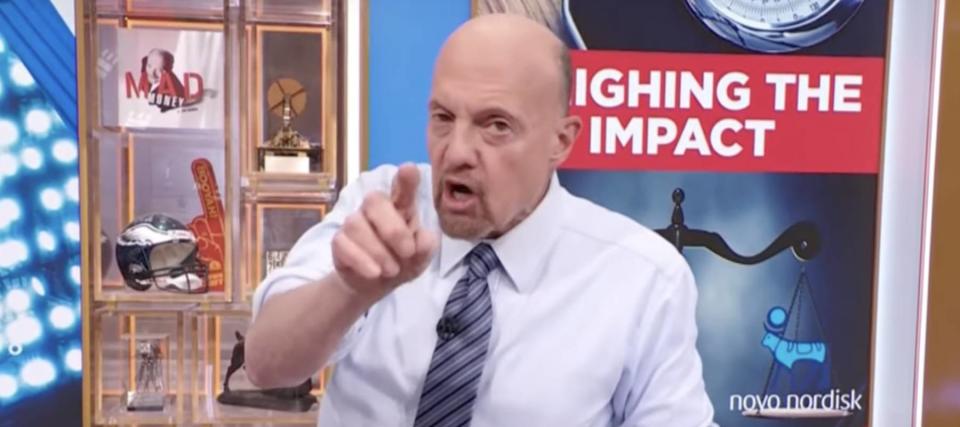‘I want to scream’: Jim Cramer is adamant that analysts are 'insane' to be so wary of ‘revolutionary’ weight-loss drugs like Ozempic — here’s why the TV host is so bullish on these stocks

Jim Cramer is convinced health insurance companies will start paying for “revolutionary” weight-loss drugs — and he thinks any analysts preaching the opposite are “insane.”
In a recent episode of CNBC’s “Mad Money,” the TV host reiterated his bullish stance on GLP-1 drugs — which are used to treat diabetes and obesity — and the companies that make them, like Eli Lilly (LLY) and Novo Nordisk (NVO).
Don’t miss
Commercial real estate has outperformed the S&P 500 over 25 years. Here's how to diversify your portfolio without the headache of being a landlord
Worried about the economy? Here are the best shock-proof assets for your portfolio. (They’re all outside of the stock market.)
'A natural way to diversify': Janet Yellen now says Americans should expect a decline in the USD as the world's reserve currency — 3 ways you can prepare
He believes it will be “cheaper for the insurance companies to shell out for the new weight-loss drugs than to let their morbidly obese customers just get heart disease.”
And as the broader use-cases of drugs like Ozempic, Wegovy, Mounjaro and Zepbound are better understood, Cramer believes they will eventually be mass-produced in pill form — and readily available under health insurance plans. That, he said on the show, will lead to pharmaceutical giants Eli Lilly and Novo Nordisk experiencing huge valuation gains.
“When I see analysts talking about how insurers won’t pay for revolutionary weight-loss drugs, I want to scream,” Cramer added. Here’s why he’s so bullish on this particular sector.
Novo Nordisk touts trial success
Cramer’s comments came shortly after Novo Nordisk revealed the results of a five-year clinical trial, which found that its semaglutide drug (sold under the brand name Wegovy) cut the risk of serious cardiovascular complications in patients with obesity issues and heart disease by 20%.
And while the trial was not designed as a weight loss trial, participants who received semaglutide lost an average 9.4% of total body weight, which was sustained throughout the trial.
Shortly after the results were announced, several market analysts proclaimed the findings would not move the needle or convince insurance companies to cover the drugs for the purpose of weight loss. That’s partly because the drugs are so expensive. Ozempic, for instance, currently costs about $900 for a one-month supply, while Wegovy has a list price of $1,349 for a one-month supply.
“I think these analysts are insane,” said a riled-up Cramer, who went on to list groups of patients he thinks health insurers will be “downright eager to cover.”
For example, he said people with type two diabetes are at risk of other health issues and therefore insurers should be “happy to pay” for drugs that can “nip [that] in the bud.”
Cramer is by no means alone in seeing the potential of GLP-1 drugs. Looking at how weight-loss drugs could evolve over time, Emily Field, head of European Pharmaceutical Research at Barclays said on CNBC’s “Squawk Box”: “There’s probably going to be a spectrum of therapeutic options available… [with] maybe some orals that could come down the pipeline further down the road … for people who are just in that overweight category.
He said he believes “there are so many other potential uses for these drugs” which “they’re just starting to explore.”
“We think that it’s still going to be this push and pull between the manufacturers and the insurers — as they’re able to show more data showing that it can save the payers money, then you’re probably going to see coverage just incrementally expand and expand.”
Read more: Rich young Americans have lost confidence in the stock market — and are betting on these 3 assets instead. Get in now for strong long-term tailwinds
Value, value, value
On Nov. 13 — the first trading day after Novo Nordisk announced the results of its trial at the American Heart Association (AHA) annual Scientific Sessions in Philadelphia — the drug maker’s shares rose 3%, highlighting investor confidence in the cardiac benefits of Wegovy. Year-to-date, NVO shares are up 42.5%, according to market analysis site Tipranks.
Its main rival in weight-loss treatment — and Cramer’s favorite drug maker of the two — Eli Lilly also saw a 1.17% lift on Nov. 13. Tipranks shows LLY shares are up 62.61% year-to-date.
Cramer dismissed fellow market analysts’ concerns over the viability of the drugs, stating: “Today’s the day when the junk food purveyors, the anti-diabetes devices and the alcohol stocks were able to run because the analysts said not to fear this new class of drugs. I say: let them run. They’re way too knocked down.”
He believes the value of NVO and LLY will grow “much higher than they are today” once the “miracle drugs are mass-produced” and available at a reasonable cost.
Back in August, Morgan Stanley analysts project the global obesity market will reach $77 billion in 2030.
What to read next
Super-rich Americans are snatching up prime real estate abroad as US housing slumps — but here's a sharp way to invest without having to move overseas
Here's how much the typical baby boomer has saved for retirement — how do you stack up right now?
Jeff Bezos and Oprah Winfrey invest in this asset to keep their wealth safe — you may want to do the same in 2024
This article provides information only and should not be construed as advice. It is provided without warranty of any kind.

 Yahoo Finance
Yahoo Finance 